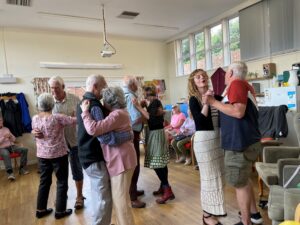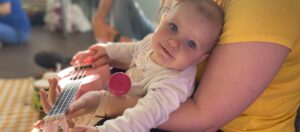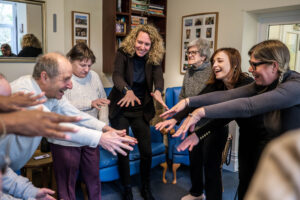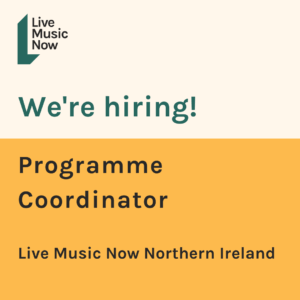 Our national initiative to explore how singing and music could be made available in all of the UK’s care homes is gathering pace. It is supported by the Baring Foundation, and led by Live Music Now, in partnership with Sound Sense and the Sidney De Haan Research Centre.
Our national initiative to explore how singing and music could be made available in all of the UK’s care homes is gathering pace. It is supported by the Baring Foundation, and led by Live Music Now, in partnership with Sound Sense and the Sidney De Haan Research Centre.
“This hugely important initiative will bring music to people who might be living the final years of their lives in loneliness or confusion. I have seen countless times that there is nothing like music to bring people together to create a safe and happy environment where human relationships can flourish.” – Julian Lloyd Webber, LMN Ambassador
The only way that something on this scale can succeed is with the support of many national partner organisations from across the arts and care sectors. Last week, we were delighted when Care England became the 30th such organisation to join us, itself representing over seven thousand care homes around England.
The first working meeting of all the organisations involved took place in London on 2 June. Several people gave short presentations about their work, and the diverse needs and issues facing the care community. Professor Stephen Clift gave a presentation about the evidence base for how musical participation and engagement, and singing in particular, can have very specific health impacts for people living with dementia, loneliness or breathing conditions. He urged us not to discount personal testimonies, which can be every bit as compelling as hard quantative data. And David Cutler from the Baring Foundation told us about the background of the project, and his own belief in its potential.
“The Baring Foundation has been funding in the field of arts and older people for the last five years. We believe that singing has a unique magic not only for older residents but for the whole community of a care home. This broad consortium is a great basis for a project which we hope will bring that magic to thousands of people.” – David Cutler, The Baring Foundation

Following this inspirational start, we got to work, identifying the steps that we would need to take over the year ahead. In small teams, we considered different aspects of what we already know, and what we don’t know, and then started to draw up a set of aims and tasks.
This is what we aim to achieve:
- Collate the existing evidence for the benefits of singing/choirs for older people/in care homes/links to the wider community. This will include benefits for staff, family and friends, choir members as well as residents.
- Map existing activity.
- Describe different models of activity, giving their benefits as well as the challenges for using these and how they can be overcome.
- Assemble any existing materials that support choirs in care homes and produce new materials where needed. This will include considerations of quality of the artistic experience and art achieved. Special reference will be made to dementia.
- Describe what more can be done without extra resources and cost what more activity could be achieved with further resources.
- Launch and widely disseminate.
We drew up lists of much more specific actions, to meet all of these aims, and then as a final step, people were invited to tell us which actions they might be able to contribute to. And without exception, everyone in the room volunteered to help in very specific ways. Every single action was covered several times. It was a very uplifting conclusion to a long and detailed day.
Since that time, we have been working with each of those organisations to ensure they have the support to work together on these actions. We are developing case studies, drawing evidence together and preparing some wide consultations for both the care and arts sectors.
You can read more about the project on its dedicated website, where you can also sign up for more specific updates. If you would like to take part in any of the consultations, please sign up there, and we’ll be in touch.






